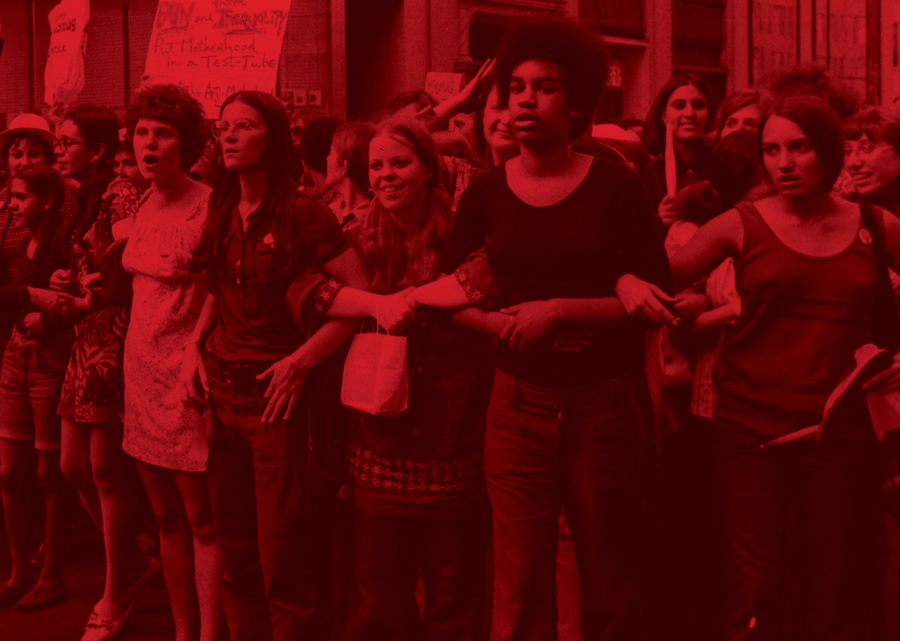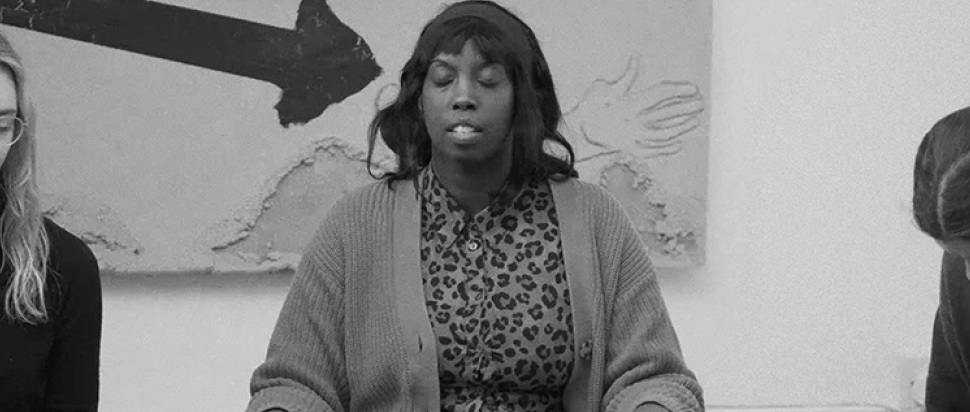Rebellious Togetherness: Grace Ndiritu interview
Artist Grace Ndiritu stages Sit-in #5: Compassionate Rebels in Action at Cooper Gallery, Dundee. She speaks to us about collective reflection, spirituality and activism
As you approach the front doors of the Cooper Gallery, you are confronted with images of protest, frozen in time yet pulsing with the weight of countless movements, struggles, and calls for change. They invite you in, not to simply witness, but to cross a threshold. Stepping on to carpet, you are gently ushered into a space where time slows, where the everyday rhythm of life suspends. This is the first act of participation in Sit-in #5: Compassionate Rebels in Action, the closing chapter of The Ignorant Art School: Five Sit-ins towards Creative Emancipation – an exhibition and event space for reflection, a rehearsal for revolution, a chance to practise slowness, engaging in the possibilities of coming together in collective contemplation.
Staged by artist, filmmaker, and writer Grace Ndiritu, Compassionate Rebels in Action invites visitors to enter a space that transforms the very act of being present. From the moment you cross the threshold, the gallery becomes a site of ritual, a space where the boundaries between past, future, and present swirl together through radical spirituality and activism. “The church, the library, the park, museum are the last four spaces within contemporary cultures, especially urban spaces where it can be a space for contemplation and dialogue,” Ndiritu notes, highlighting the need to carve out environments where both intellectual and energetic shifts are possible.

Women’s Strike, New York City, 26 August 1970. Photo: Diana Davies. Courtesy Diana Davies and the Sophia Smith Collection.
Ndiritu’s family history, rooted in activism, is central to her practice. Raised in an environment where protest was not an abstraction but an intimate part of life, she reflects on the influence of her mother, a feminist and anti-Apartheid activist. “She was involved in organising debates, film screenings, they printed t-shirts and they would have discussion groups around the dining table but also, we would go to do practical things, like marches," Ndiritu says. Her work carries this legacy, not as reenactment, but as a living thread, folding protest into the textures of tending-toward togetherness.
This sense of collective power runs through Compassionate Rebels in Action, which uses protest imagery, carpets, film, mirrors, and study space to draw participants into a state of communal entanglement. These elements are more than just visual tools for Ndiritu, they function as channels for healing and decolonisation. Ndiritu states that this is where spirituality and activism converge: in the recognition that we cannot separate our political movements from the healing processes necessary for lasting change.
“As an artist and as a spiritual practitioner, everything is so intermingled between spirituality, creativity, and politics,” Ndiritu says. “Spirituality is integral to activism,” emphasising that healing must be central to the process of social transformation. For Ndiritu, healing is not about escapism or superficial remedies. Instead, it is a tool in the process of institutional critique, a way to challenge the colonial and economic systems that perpetuate injustice. “Healing is cathartic,” she explains. “What we need to do with institutions is to go through these deeper processes.” Sit-in #5 and its accompanying public programme, filled with gatherings and discussions, are shaped with this very intention, to create conditions for that depth of reflection, dialogue, and repair.
Commissioned as part of Sit-in #5, Ndiritu’s new book, Glossary for Art and Action, gathers together a collection of terms she has developed over the past two decades to address the spiritual and political dimensions of resistance. “There’s a limited vocabulary, we use words like ‘solidarity’ and ‘collectivity,’” she explains. “Over the years, I’ve invented terms that are both spiritual and political, ones that could start this new language.” Terms such as Compassionate Rebel, Dissent Without Modification, Transition Zone, and Healing as a Form of Institutional Critique offer language for thinking and acting differently. For Ndiritu, this glossary is not just about language, but about “Having a vision for the bigger picture,” expanding how we imagine resistance, relation, and renewal.
Ndiritu hopes visitors won’t just leave with something learned, but with something shifted, a sense of how to move and act differently in the world: “I want visitors to meet different people, and the exhibition will keep working after it closes.” Ndiritu offers a grounded proposition, that transformation begins with how we gather, how we listen, and how we care, an ongoing rehearsal for how we might gather, resist, and rebuild. It holds space for slowness, for reckoning, for solidarity not yet fully formed, and space to envision a more compassionate and transformative world.
Sit-in #5: Compassionate Rebels in Action, Cooper Gallery, Dundee, 10 Oct-13 Dec, Tue-Sat, 12-5pm
dundee.ac.uk/events/ignorant-art-school-sit-5-grace-ndiritu
